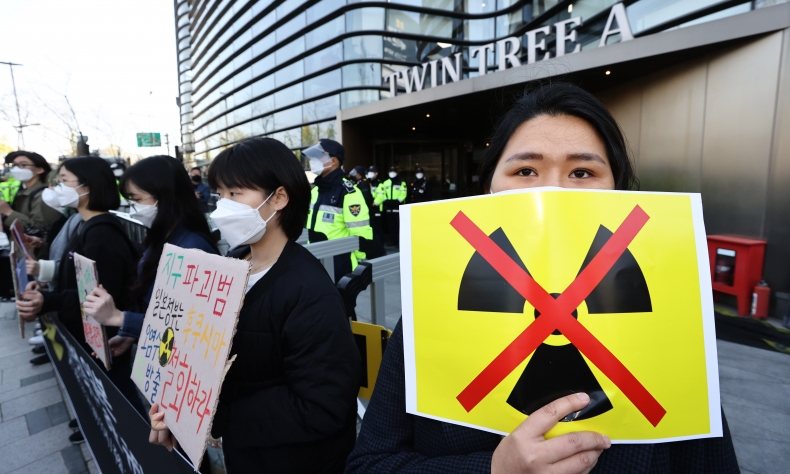Building on China-South Korea Ties with Some Urgency

South Korea’s ruling party can no longer play the waiting game as next year’s national elections could change everything. Now it is the moment for South Korea to forge deeper ties with China.
Recently, South Korean voters from the capital city Seoul and southeastern port city Busan elected in a landslide the mayoral and city council candidates from the conservative opposition People Power Party (PPP). The ruling Together Democratic Party (DPK) led by South Korean President Moon Jae-in was crushed and that sets the stage for gloomy prospects for the DPK’s chances in national elections next year.
According to the country’s Constitution, a President can only serve one 5-year term. The PPP appears poised to return to power and their candidates are pro-United States and anti-China, while the DPK favors a more “neutral” diplomatic policy in regards to China and its Asian neighbors. Should the PPP win next year’s elections, they will support President Joseph R. Biden’s efforts to contain China and to play a more prominent role in Washington’s Indo-Pacific strategy, known as the Quad.
The Quad is composed of four member states – US, India, Japan and Australia – as they intend to assume a more bellicose stance by deploying their respective Naval vessels to sail into the South China Sea to demonstrate Washington’s stand to spark more territorial disputes in the region and to recruit more foreign powers to impose diplomatic and economic sanctions against Beijing.
South Korea doesn’t choose a side between US and China
The Biden administration has revamped the Cold War and American hegemony strategy on the Asian continent and such efforts could lead to serious disruptions in world affairs.
For the time being, President Moon remains committed for South Korea to stay neutral and the nation’s Foreign Minister Chung Eui-yon met his Chinese counterpart Wang Yi in Xiamen on April 3 as the two officials highlighted the benefits of strengthening Beijing-Seoul relations.
From the perspective of the balance of world powers, Seoul appears to be placed in a diplomatic quandary that could corner. Nevertheless, South Korea can enjoy renewed hope on the horizon by staying vigilant as neutral player for the northeast Asia region.
Seoul understands the political mood of its citizens can change rapidly and overnight. For the moment, anti-China sentiments are stronger than normal in the country but South Korea and Japan have been long-time rivals and one shouldn’t believe the Biden White House will usher in permanent social harmony between the Japanese and South Koreans. Eventually, tensions will erupt again between Seoul and Tokyo and it could be connected to their respective territorial claims over Dokdo/Takeshima islands. Recently, Japanese government’s decision to dump Fukushima nuclear water into sea has sparked strong opposition of neighboring countries, including South Korea, China and Russia.
South Korea works with China on the Peninsula issue
Meanwhile, the South Korean government has demonstrated a more open-minded approach in regards to issues over the Korean Peninsula. Washington, Brussels, London and Tokyo have taken hard-line stances on Pyongyang and are refusing to agree to ease the international sanctions and diplomatic isolation imposed on the North Korean regime.
Chinese President Xi Jinping has called for the West to lift some sanctions on North Korea as a gesture of good will, which could bring about a positive response from North Korean leader Kim Jong-un. Nonetheless, the US-led side has refused to show any compromise.
South Korea has hinted they would prefer a softer approach, which explains why they have chosen neutrality when Washington has become more assertive about demanding Seoul take sides with the US.
Perhaps a proper geo-political strategy would be for all sides to endorse a phased sanctions’ easing in stages to persuade Pyongyang to dismantle its nuclear weapons and embrace peace on the Peninsula. The policy would go like this: Washington lifts some sanctions for a six-month time-frame and Pyongyang in return is expected to start disabling its nuclear installations.
Should Pyongyang meet targets and agree to international inspections, six months later Washington can ease further sanctions on North Korea but if Pyongyang refuses to cooperate the US can return back to increasing sanctions again. The process will be ongoing until there are no more nukes on the Korean Peninsula. Hence, North Korea will be rewarded for good behavior and punished if it fails to meet its promised commitments.
Seoul had formulated the Sunshine Policy when Kim Dae-jung was South Korean President from 1998 to 2003. He sought warmer ties with Pyongyang as South Korea provided substantial foreign aid in the form of food supplies and other daily necessities delivered to the people of North Korea. The policy was abandoned after the conservatives returned to power in South Korea.
But it’s a good time for President Moon to reset the Sunshine Policy and that can bring about greater harmony. China and Russia can lend a helping hand as well. Seoul has invited Chinese President Xi Jinping to visit South Korea after international travel restrictions are lifted and the coronavirus pandemic gets contained.
China-South Korea ties get warmer
China and South Korea can strengthen bilateral relations and to accelerate more economic cooperation, increase cross-border trade and investments between the two Asian neighbors. China is already South Korea’s largest trade partner and brighter days stand on the horizon.
Chinese consumers are more eager to purchase imported products, while South Korean companies remain focused on manufacturing and exports. The rise of China’s economy offers amazing opportunities for South Korean automobiles, steel, electronics, science & hi-tech sectors to include semiconductors, mobile devices, automated manufacturing, Big Data, 5G networks, and so much more.
We are facing worldwide shortages and supply chain disruptions for semiconductors, while South Korea-based Samsung Corp. is one of the global leading makers of semiconductors. Korean semiconductor manufacturers can fill in the gaps by investing more into China’s semiconductor industry and to inject more funding into its current foundries in the country. Samsung operates a semiconductor huge foundry in Xi’an, western China’s Shaanxi Province.
In return, the Chinese should be more open-minded about South Korean pop culture. The KPop music scene has captured a growing international fanbase with the music group BTS performing to sold out stadiums in major cities across the world. So long as KPop bands are respectful of Chinese values they should be welcomed to perform in Chinese cities after international travel restrictions get lifted.
We should take careful note on the development of 5G telecom networks as well. Washington has bullied many foreign nations to decouple from China’s 5G networks, but Seoul continues to work in close partnership with Beijing, since 5G can boost WiFi speeds and memory storage, which in return can sweep in big-time upgrades on AI (artificial intelligence), smart technologies, IoT (internet of things), digital technologies and more.
5G and the next wave 6G networks will forever transform all our lives as we know it. Both the South Korean and Chinese governments have promoted innovations in their respective science and hi-tech fields. If the two sides can capture more collaboration that could pave the way for the two nations to emerge as Hi-tech Superpowers.
Beijing and Seoul can garner amazing win-win benefits from mutual cooperation but time is limited. South Korea’s ruling party can no longer play the waiting game as next year’s national elections could change everything. Now it is the moment for South Korea to forge deeper ties with China.
The article reflects the author’s opinions, and not necessarily the views of China Focus.
 Facebook
Facebook
 Twitter
Twitter
 Linkedin
Linkedin
 Google +
Google +



